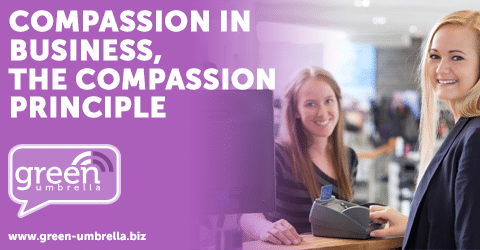Compassion in Business, The Compassion Principle

Compassion in Business, The Compassion Principle

It is often said that being in business is like being in a battle.
Only the strong survive, the weak will perish, that it’s dog eat dog out there.
Many people will quote you the ancient text ‘The Art of War’ by Sun Tzu as a go to read for the serious business professional without ever having read it because the title implicates that you fight your way to the top and take no prisoners on the way.
Fighting, though, is not the theme of the book. If you want a quick video preview of the book go here https://youtu.be/BOLXv3nqDkI
But is there another way? As Sun Tzu says, Can you win without fighting?
What if you didn’t waste any energy on trying to destroy the opposition?
What if your focus changed from how you can win to how you can help?
Most people like to deal with good, honest, and helpful people
The more you help people get what they want, the more your worth and value will rise
“You will get all you want in life if you help enough other people to get what they want” ~ Zig Ziglar
Engaging the law of Reciprocity can help to bring you results
People are often shy about asking for referrals as a way of building their business, but if you truly use the law of reciprocity it will become a natural process, and your customers will be happy to help you to grow
In simple terms, reciprocity invokes the basic need of most humans to reciprocate when somebody treats them well.
Most people don’t like to feel indebted to someone and are usually glad of an opportunity to return the favour
The old phrase “if you scratch my back, I’ll scratch yours” is simply turned on its head by you making the first move by asking “how can I help?”
For Example
Working in a territory management role for a premium professional equipment sales organisation, I was intrigued by the customer feedback received for two reps on neighbouring territories during a surveying exercise.
Both reps were selling ostensibly the same product on the same terms at the same price, and were selling the market leading product range in the industry sector they were working in. Rep one had been on his territory for some seven years and rep two for approximately five
Rep One
It was obvious almost from the outset of the first survey that rep number one had become very complacent about his perceived strong market position and was delivering a poor customer experience. Poor stock levels, poor warranty back up, poor use of promotions and deals, and sloppy customer visiting patterns.
I knew this because, almost without exception, his customers complained to me about all of the above, and usually finished the conversation with words along the lines of ‘and everything is too expensive, that’s why I don’t buy from your company any more.’
Rep Two
Moving literally across the road it was as if I was working for a different company
Fiercely protective of their rep, the first question I got asked was what I was doing there, followed by a statement along the lines of ‘if you take our rep away we will stop buying from you.’
All this loyalty and the customer’s obvious satisfaction was backed up by the physical evidence of a lot of product being happily bought by them.
No-one mentioned price
So what was the difference? It wasn’t the product offered or the price point. It was all about the service level and the way people were treated.
So why the title of the blog Compassion in Business, The Compassion Principle?
Compassion is a way of thinking in business as in life.
Acting with genuine compassion will encourage loyalty and bring reciprocity into play
If you take a genuine interest in helping your customers, then there is a good chance that they will become advocates for your business.
If you have people you work with or who work for you, then act with Compassion there too
We deal with people, and people mess up
Here is an article from `The Harvard Business Review’ entitled ‘Why Compassion is a Better Managerial Tactic than Toughness’
You won’t win all your battles, and sure some people will take advantage of you, and that is perfectly fine. That is just how people are.
You have little control over how those few people choose to act, but you can to a degree influence how the majority of people respond, and even if there is no instantly tangible pay back for acting with compassion in any given situation, I guarantee that you will feel better as a result of doing the right thing, you will sleep better, and knowing that you acted with integrity is a great feeling when all is said and done.
That is also known as acting with compassion for the self, which in this frantic and busy society is a rare and valuable thing indeed, being kind to ourselves.
[social-bio]
Share this!

